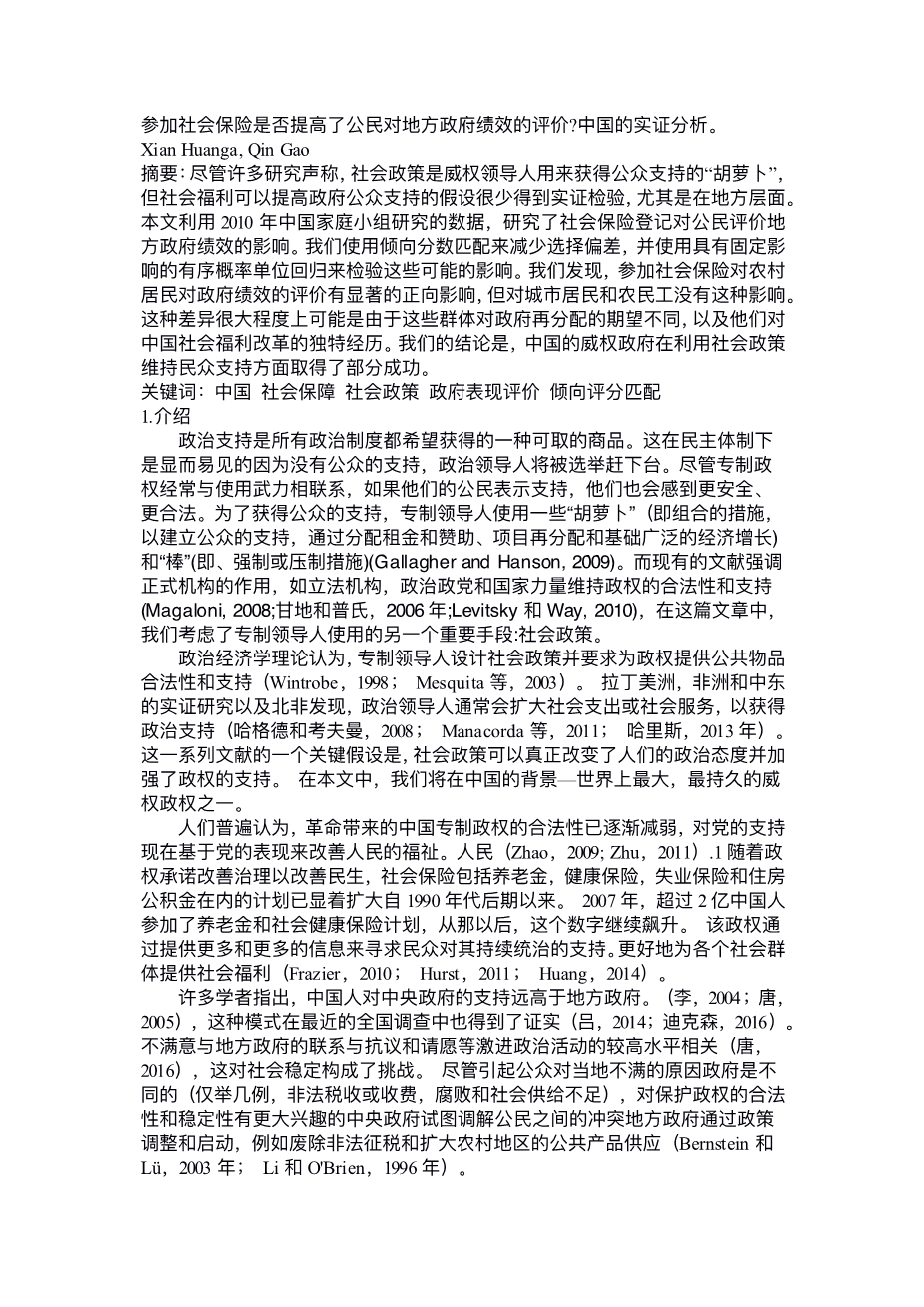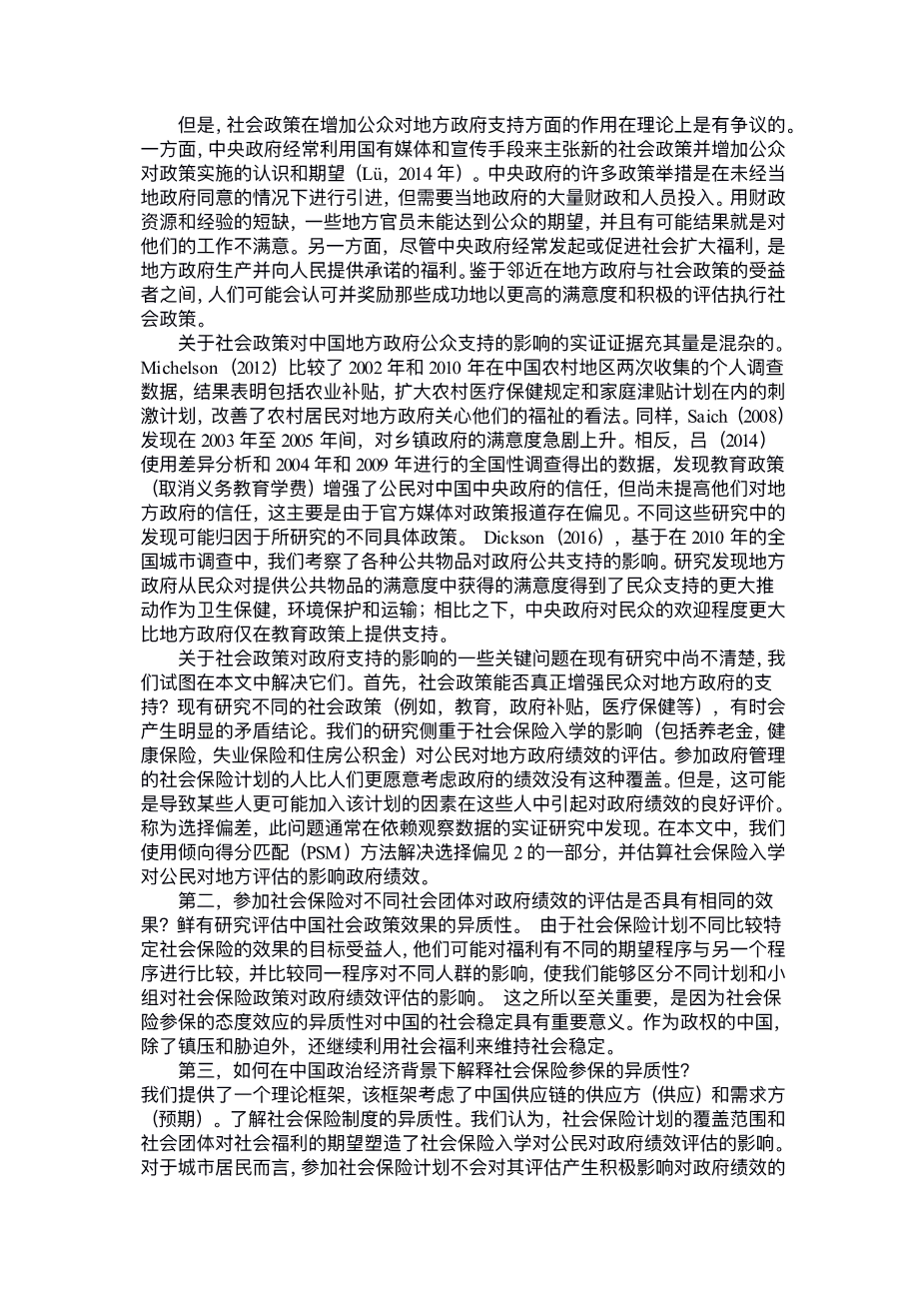参加社会保险是否提高了公民对地方政府绩效的评价?中国的实证分析外文翻译资料
2022-08-19 15:14:05
Does social insurance enrollment improve citizen assessment of local government performance? Evidence from China
ABSTRACT
Although many studies claim that social policies are “carrots” that authoritarian leaders use to
garner public support, the assumption that social benefits can boost public support of government has been rarely tested empirically, especially at the local levels. This article investigates the effects of social insurance enrollment on citizens assessment of local government performance using data from the 2010 China Family Panel Study. We use propensity score matching to reduceselection bias and ordered probit regressions with fixed effects to examine these possible effects.
We find that social insurance enrollment had a significant positive effect on rural citizens assessment of government performance, but this effect did not exist for their urban and migran peers. This discrepancy could be largely due to the groups different expectations for government
redistribution and their distinct experiences of Chinas social welfare reform. We conclude that the Chinese authoritarian government has achieved partial success in its attempt to use social policies to maintain popular support.
Keywords:
China Social insurance Social policies Assessment of government performance
Propensity score matching
1. Introduction
Political support is a desirable commodity that all political systems wish to acquire. It is obvious under democracy because without public support political leaders will be removed from office by elections. Even though authoritarian regimes are often associated with using force, they also feel more secure and legitimate if their citizens show support. In order to garner public support, authoritarian leaders use some combination of “carrots” (i.e., measures that build public support through the distribution of rents and patronage, programmatic redistribution and broad-based economic growth) and “sticks” (i.e., coercive or repressive measures)(Gallagher and Hanson, 2009). While existing literature emphasizes the role of formal institutions such as legislatures, political parties and state forces in maintaining regime legitimacy and support (Magaloni, 2008; Gandhi and Przeworski, 2006; Levitsky and Way, 2010), in this article we consider another important means that authoritarian leaders utilize: social policies.
Political economy theory posits that autocratic leaders design social policies and mandate public goods provision for regime legitimacy and support (Wintrobe, 1998; Mesquita et al., 2003). Empirical studies in Latin America, Africa, and the Middle East and North Africa have found that political leaders often expand social spending or social services to garner political support (Haggard and Kaufman, 2008; Manacorda et al., 2011; Harris, 2013). A key assumption underlying this string of literature is that social policies can really change peoples political attitudes and bolster regime support. In this paper, we will explicitly test this assumption in the context of China—one of the largest and most enduring authoritarian regimes in the world.
It is widely believed that the legitimacy of the Chinese authoritarian regime derived from the revolution has gradually diminished, and that support for the party is now based on its performance to bring about improvements in the well-being of the people (Zhao, 2009; Zhu, 2011).1 With the regimes pledge of better governance to improve peoples livelihoods, social insurance programs, including pensions, health insurance, unemployment insurance and the housing provident fund, have expanded notably since the late 1990s. In 2007, more than two hundred million Chinese were enrolled in pension and social health insurance programs,and the numbers have continued to soar since. The regime seeks to elicit popular support for its continued rule by providing more and better social welfare benefits to various social groups (Frazier, 2010; Hurst, 2011; Huang, 2014).
Many scholars have noted that the Chinese support for the central government is significantly higher than for local governments(Li, 2004; Tang, 2005), a pattern also confirmed in studies based on recent national surveys (Luuml;, 2014; Dickson, 2016). Dissatisfaction with local governments are found correlated with higher level of radical political actions such as protesting and petition (Tang,
2016), which constitutes a challenge to social stability. Although the causes that generated the publics dissatisfaction with local governments are different (to name a few, illegal taxation or fees, corruption, and insufficient social provisions), the central government, which has greater interest in protecting the regimes legitimacy and stability, tries to mediate the conflicts between citizens
and the local government by policy adjustment and initiation such as abolishing illegal taxation and expanding public goods provision in rural areas (Bernstein and Luuml;, 2003; Li and OBrien, 1996).
However, social policies effects in boosting public support for the local government are theoretically debatable. On the one hand,the central government often takes advantage of state media and propaganda to claim credit for new social policies and to increase public awareness of and expectations for policy implementation (Luuml;, 2014). Many of the central governments policy initiatives are introduced without local government consent yet require substantial financial and staffing input from the local government. With a shortage of fiscal resources and experience, some local officials fail to live up to the expectations of the public, and a possible consequence is dissatisfaction with their work. On the other hand, although the central government often initiates or promotes social welfare expansion, it is the local governments that produce and deliver the
剩余内容已隐藏,支付完成后下载完整资料


英语译文共 5 页,剩余内容已隐藏,支付完成后下载完整资料
资料编号:[410808],资料为PDF文档或Word文档,PDF文档可免费转换为Word




